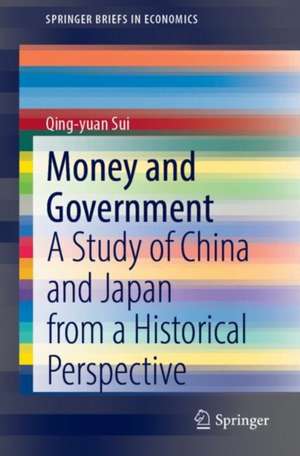Money and Government: A Study of China and Japan from a Historical Perspective: SpringerBriefs in Economics
Autor Qing-yuan Suien Limba Engleză Paperback – 20 mar 2022
Din seria SpringerBriefs in Economics
-
 Preț: 444.35 lei
Preț: 444.35 lei -
 Preț: 264.79 lei
Preț: 264.79 lei - 15%
 Preț: 462.51 lei
Preț: 462.51 lei -
 Preț: 47.33 lei
Preț: 47.33 lei -
 Preț: 353.14 lei
Preț: 353.14 lei -
 Preț: 273.32 lei
Preț: 273.32 lei -
 Preț: 376.04 lei
Preț: 376.04 lei -
 Preț: 379.09 lei
Preț: 379.09 lei -
 Preț: 380.07 lei
Preț: 380.07 lei -
 Preț: 377.35 lei
Preț: 377.35 lei -
 Preț: 379.09 lei
Preț: 379.09 lei -
 Preț: 376.59 lei
Preț: 376.59 lei -
 Preț: 408.27 lei
Preț: 408.27 lei -
 Preț: 379.09 lei
Preț: 379.09 lei -
 Preț: 383.27 lei
Preț: 383.27 lei -
 Preț: 378.54 lei
Preț: 378.54 lei -
 Preț: 377.95 lei
Preț: 377.95 lei -
 Preț: 340.23 lei
Preț: 340.23 lei -
 Preț: 380.25 lei
Preț: 380.25 lei -
 Preț: 378.12 lei
Preț: 378.12 lei -
 Preț: 376.04 lei
Preț: 376.04 lei -
 Preț: 376.04 lei
Preț: 376.04 lei -
 Preț: 379.68 lei
Preț: 379.68 lei -
 Preț: 381.00 lei
Preț: 381.00 lei -
 Preț: 375.23 lei
Preț: 375.23 lei -
 Preț: 376.80 lei
Preț: 376.80 lei -
 Preț: 378.54 lei
Preț: 378.54 lei -
 Preț: 377.57 lei
Preț: 377.57 lei -
 Preț: 376.04 lei
Preț: 376.04 lei -
 Preț: 378.92 lei
Preț: 378.92 lei -
 Preț: 375.62 lei
Preț: 375.62 lei -
 Preț: 379.09 lei
Preț: 379.09 lei -
 Preț: 353.67 lei
Preț: 353.67 lei -
 Preț: 342.14 lei
Preț: 342.14 lei -
 Preț: 375.45 lei
Preț: 375.45 lei -
 Preț: 379.09 lei
Preț: 379.09 lei -
 Preț: 377.35 lei
Preț: 377.35 lei -
 Preț: 344.86 lei
Preț: 344.86 lei -
 Preț: 377.35 lei
Preț: 377.35 lei -
 Preț: 345.89 lei
Preț: 345.89 lei -
 Preț: 377.57 lei
Preț: 377.57 lei -
 Preț: 343.83 lei
Preț: 343.83 lei -
 Preț: 378.12 lei
Preț: 378.12 lei -
 Preț: 345.06 lei
Preț: 345.06 lei -
 Preț: 379.48 lei
Preț: 379.48 lei -
 Preț: 379.48 lei
Preț: 379.48 lei -
 Preț: 380.07 lei
Preț: 380.07 lei -
 Preț: 375.45 lei
Preț: 375.45 lei -
 Preț: 445.33 lei
Preț: 445.33 lei -
 Preț: 378.54 lei
Preț: 378.54 lei
Preț: 410.39 lei
Nou
Puncte Express: 616
Preț estimativ în valută:
78.53€ • 82.10$ • 66.36£
78.53€ • 82.10$ • 66.36£
Carte tipărită la comandă
Livrare economică 06-20 martie
Preluare comenzi: 021 569.72.76
Specificații
ISBN-13: 9789811688737
ISBN-10: 9811688737
Pagini: 87
Ilustrații: XIII, 87 p. 13 illus., 2 illus. in color.
Dimensiuni: 155 x 235 mm
Greutate: 0.16 kg
Ediția:1st ed. 2022
Editura: Springer Nature Singapore
Colecția Springer
Seria SpringerBriefs in Economics
Locul publicării:Singapore, Singapore
ISBN-10: 9811688737
Pagini: 87
Ilustrații: XIII, 87 p. 13 illus., 2 illus. in color.
Dimensiuni: 155 x 235 mm
Greutate: 0.16 kg
Ediția:1st ed. 2022
Editura: Springer Nature Singapore
Colecția Springer
Seria SpringerBriefs in Economics
Locul publicării:Singapore, Singapore
Cuprins
Preface.- Chapter 1. A Preliminary Introduction.- Chapter 2. Puzzles of the Monetary Regime in Premodern China.- Chapter 3. The Divergence between China and Japan.- Chapter 4. The Worst Currency or The Best Arrangement?.- Chapter 5. An Epilogue.- Index.
Notă biografică
Qing-yuan Sui is Professor of Economics at the Yokohama City University, Japan. He received his doctoral degree from Tokyo University. His research is mainly in the area of money and banking system. E-mail: usui@yokohama-cu.ac.jp
Textul de pe ultima copertă
This is the first book to focus comparatively on the development processes of finance in China and Japan during the prewar period. The key issue is how to evaluate the role of government in the establishing of modern financial system. Both China and Japan started from a similar pre-modern situation in the middle of 19th century in that the monetary conditions were primitive and complicated, the traditional financial institutions were money-exchange-based, and above all, both countries had faced serious challenging pressure from the Western powers. International or domestic military affairs largely affected the development processes in both countries. While Japan succeeded in establishing its modern financial system that consistently supported its economic growth, China failed to modernize its money and banking system effectively at least until the end of World War II and the government had to change hands to the socialists, which further delayed the financial development. The experience of Japan suggests that the establishment of modern financial system may not simply be as a result of "spontaneous order", a concept used by Hayek, at least for the case of a catching-up country. The evolution process of money and banking in China shows that the role of government, especially its enforcement ability of and compliance to the rule of law may be more important than the "legal origins".
Caracteristici
Compares the modernization process of banking system between China and Japan Evaluates the importance of spontaneous order, origin of law Discusses the role of government in establishing effective financial system from historical perspectives
